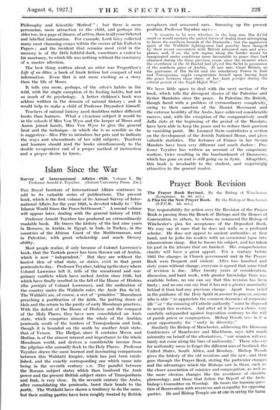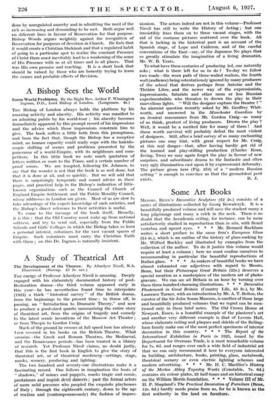Prayer Book Revision
A Plea for the New Prayer Book. By the Bishop of Manchester. (S.P.C.K; 4d. net.)
responsibility for action over the Revision of the Prayer Book is passing from the Bench of Bishops and the Houses of Convocation to others, to whom we commend the Bishop of Winchester's plea for acceptance of the Deposited Book. We may say at once that he does not write as a profound scholar. He does not appeal to ancient authorities at first hand, and he jerks his readers with an occasional lapse into inharmdnious slang. But he knows his subject, and has taken his part in the labours that are finished. His comprehensive charity will have a great appeal. For a century before i 1662 the changes in Church government and in the Prayer Book were frequent and violent. After two hundred and sixty years without change, everyone is agreed that some kind of revision is due. After twenty years of consideration, discussion, and hard work, with greater knowledge than was available before; no one can say that this revision has been hasty ; and no one can say that it has not a greater unanimity behind it than had any previous change. Apart from belief in the guidance of the Holy Spirit in answer to prayer, anyone who is able " to appreciate the common decencies of corporate life " or " the meaning of Catholic authority " must be disposed to accept this revision. And after all it leaves a choice very carefully safeguarded against imposition contrary to the will of parish priest or congregation. Bishop Woods sees in it a great opportunity for " unity in diversity."
Similarly the Bishop of Manchester, addressing the Diocesan Conferences of Manchester and Blackburn, says with much solemnity on behalf of the alternatives, " our reunion will cer- tainly not come along the lines of uniiormity." Those who cry for uniformity seem to forget the different uses of Scotland, the United States, South Africa, and Bombay. Bishop Woods gives the history of the old revisions and the new, and then
goes through the Prayer Book, stating the particular changes and the advantages which the Bishops saw in them, such as the closer association of minister and congregation, as well as the more obvious changes like the avoidance of obsolete phraseology, and those that follow the Report of the Arch- bishop's Committee on Worship. He treats the burning ques- tion of Reservation with reverence and sympathy for opposing parties. He and Bishop Temple are at one in seeing the harm done by unregulated anarchy and in admitting the need of the sick as increasing and demanding to be met. Both argue well on different lines in favour of Reservation for that purpose. Bishop Woods argues weightily against the recognition of Reservation for purposes of devotion in Church. He feels that it would create a Christian Shekinah and that a regulated habit of going to a particular spot to realize the constant Presence of Christ there must inevitably lead to a weakening of the sense of His Presence with us at all times and in all places. That was His own promise and teaching. It is a short book that should be valued by those who are honestly trying to learn the causes and probable effects of Revision.







































 Previous page
Previous page